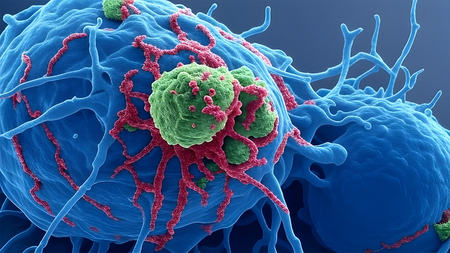
New Delhi, Aug 8 (IANS) An international team of researchers has identified new risk factors in DNA that promote tumour development in the lining of the uterus.
Cancer of the lining of the uterus, also known as endometrial cancer, is a common gynaecological cancer. Around 400,000 women are diagnosed with the disease every year worldwide, and around 100,000 die from it.
Common risk factors include obesity, diabetes, and high levels of the sex hormone oestrogen. The risk of developing endometrial cancer also increases with age.
However, around 5 per cent of cases are due to a genetic predisposition: gene mutations that increase the risk of cancer as the basis for a hereditary syndrome, such as Lynch syndrome or Cowden syndrome. Yet, a large proportion of the genetic causes are still unclear.
The team from Hannover Medical School (MHH) in Germany discovered five new locations in the genome that are very likely to play a role in the development of endometrial cancer.
The findings, published in the journal eBioMedicine, increased the number of known genomic risk factors for endometrial cancer from 16 to 21.
“This brings us one step closer to our goal of predicting the risk of hereditary uterine cancer as accurately as possible,” said Dr. Thilo Dörk-Bousset, head of the gynaecological research unit at MHH
“The more genes we find that are responsible, the more accurately we can calculate the probability of a woman developing endometrial cancer,” Dörk-Bousset added.
For the study, the team collated genetic data from national biobanks in various countries and compared the occurrence of genetic changes in more than 17,000 patients with endometrial cancer with the genomes of around 290,000 healthy women.
The results were then verified in another set of study participants.
The team examined one of the new risk genes — called Navigator-3 (NAV3)– in more detail in special target lines from uterine tissue. When NAV3 was deactivated, the uterine cells grew faster. Excessive NAV3 activity, on the other hand, led to cell death.
“These results suggest that NAV3 normally limits cell growth in the endometrium and thus suppresses cancer formation as a so-called tumor suppressor gene,” explains Dr. Dhanya Ramachandran, molecular biologist at MHH.
“Accordingly, NAV3 is greatly reduced in endometrial carcinomas.”
The research may help develop potential preventive strategies and new therapeutic approaches, said the team.
–IANS
rvt/




